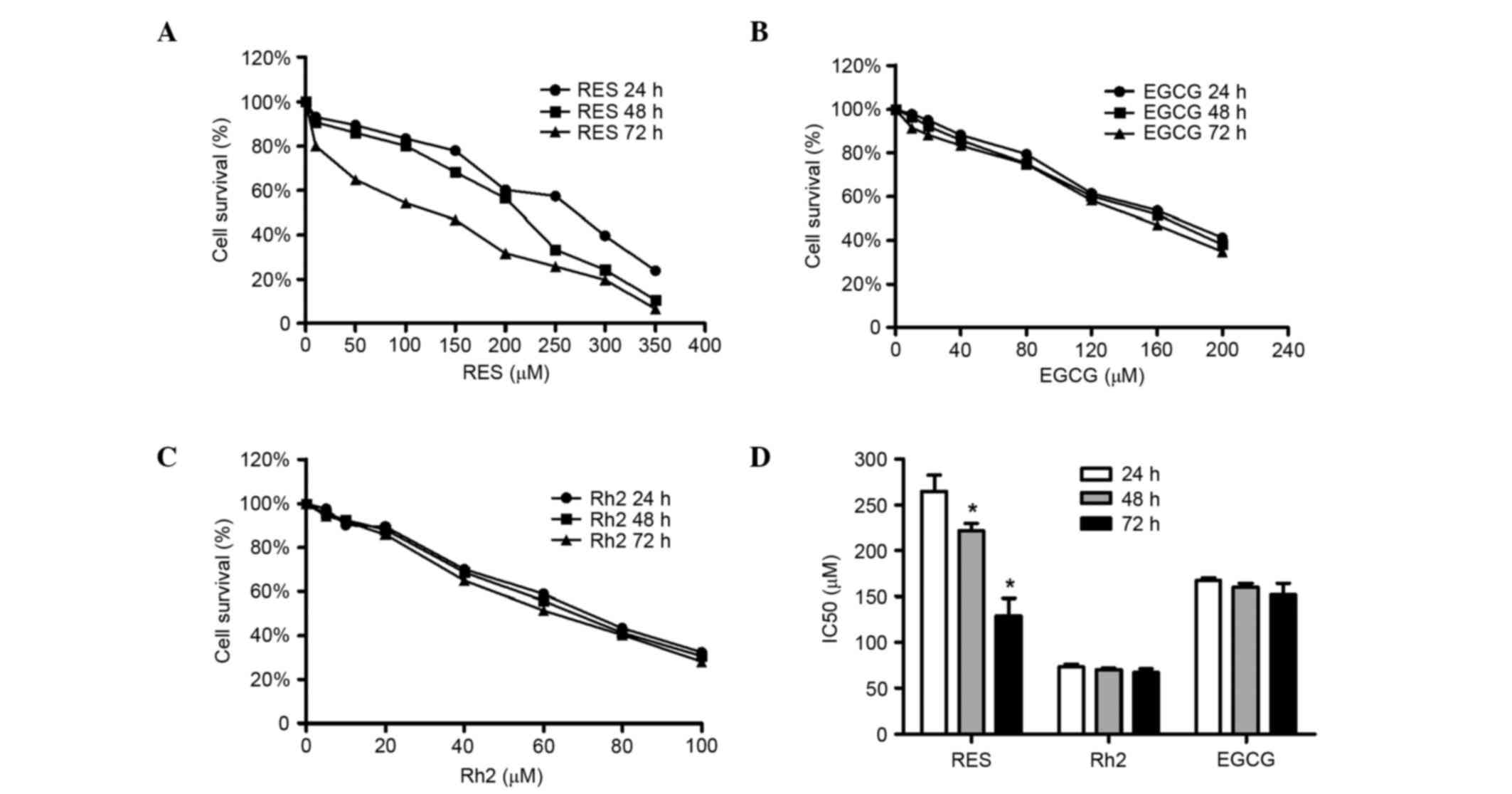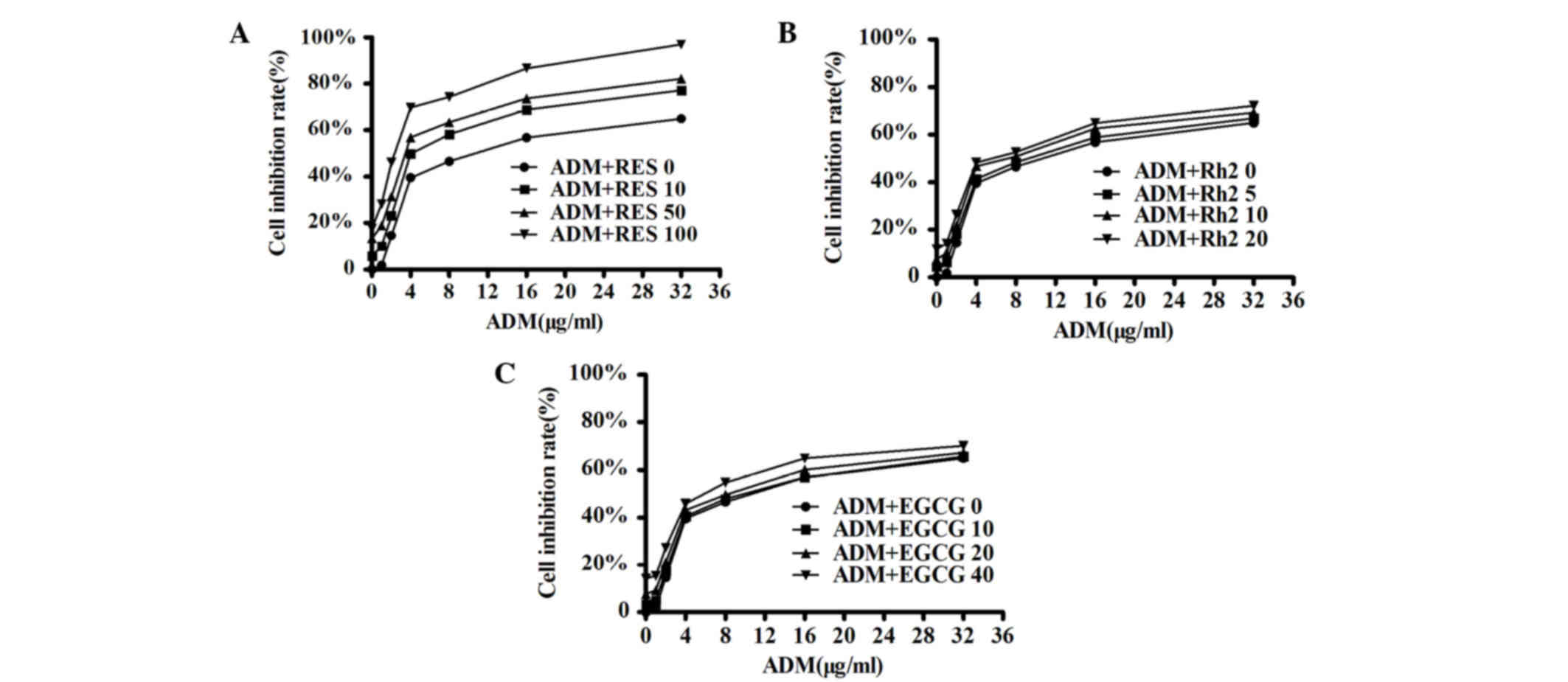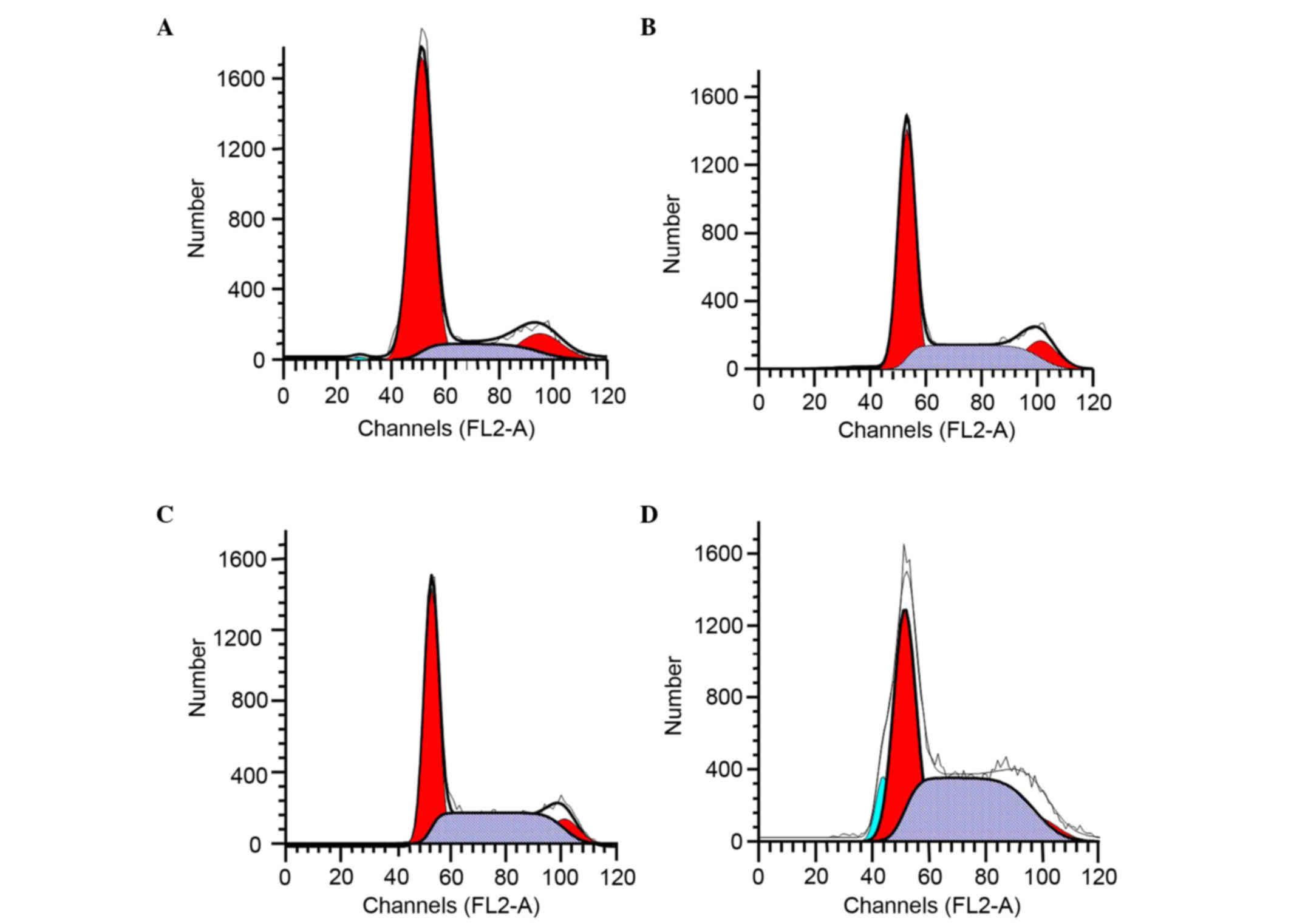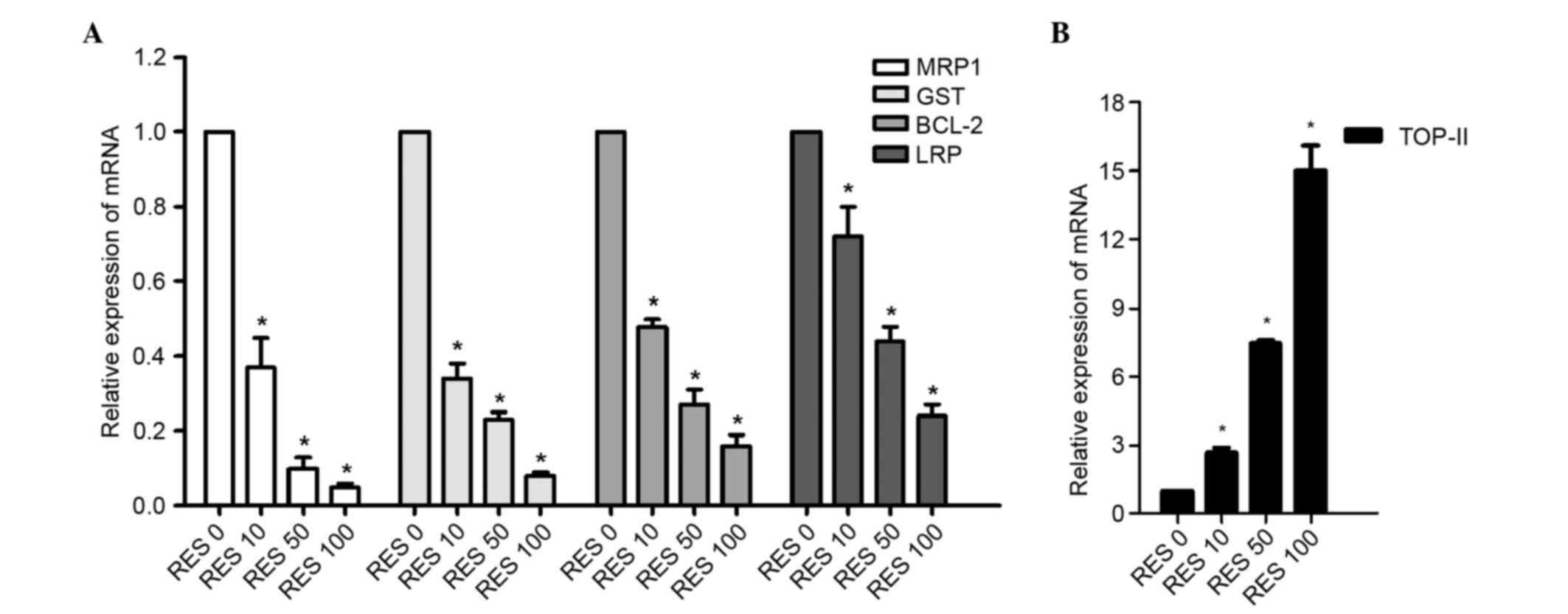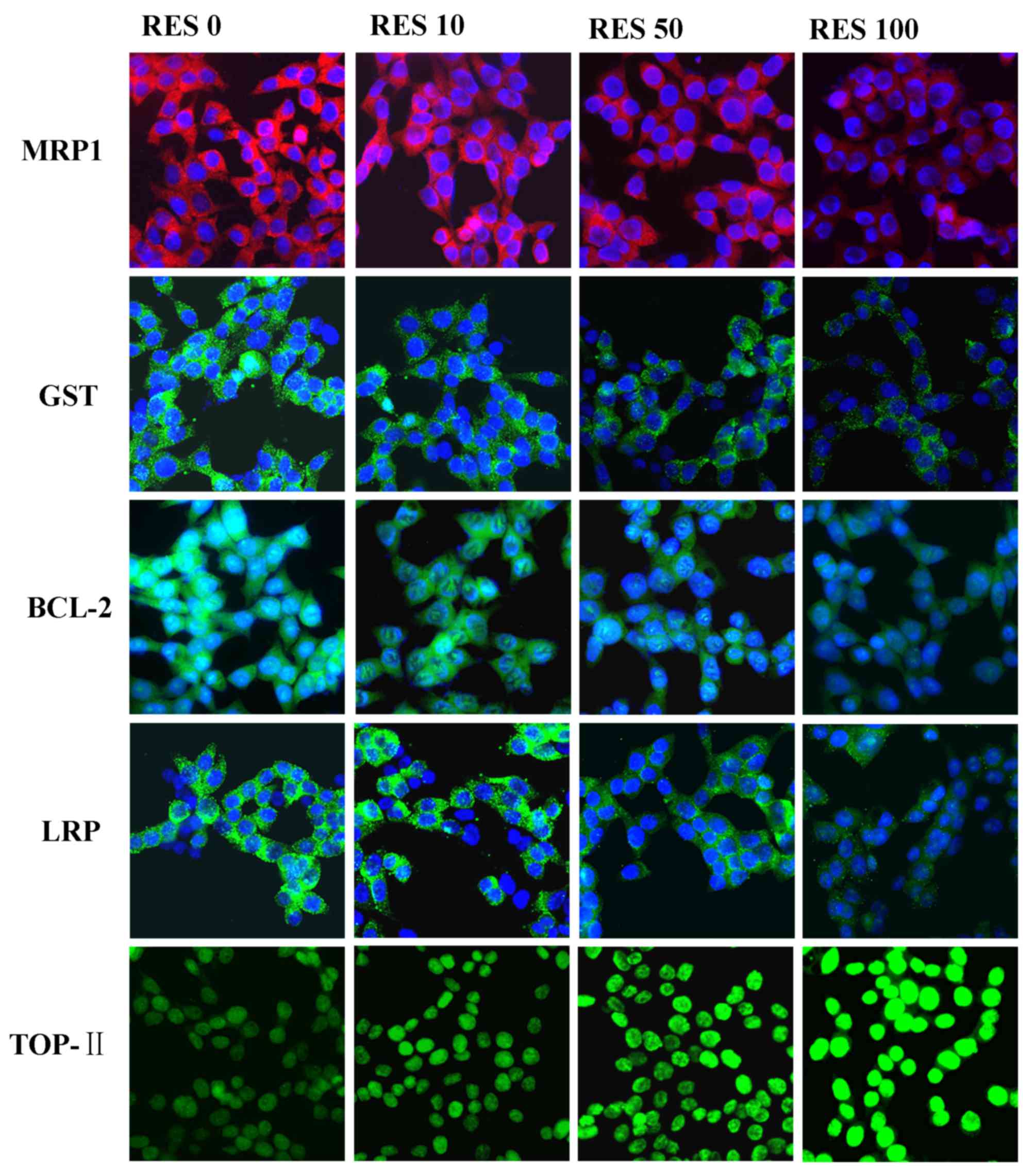|
1
|
Gingrich JR: Bladder cancer:
Chemohyperthermia for bladder cancer-clinically effective? Nat Rev
Urol. 8:414–416. 2011. View Article : Google Scholar : PubMed/NCBI
|
|
2
|
Kaufman DS, Shipley WU and Feldman AS:
Bladder cancer. Lancet. 374:239–249. 2009. View Article : Google Scholar : PubMed/NCBI
|
|
3
|
Krishna R and Mayer LD: Multidrug
resistance (MDR) in cancer. Mechanisms, reversal using modulators
of mdr and the role of mdr modulators in influencing the
pharmacokinetics of anticancer drugs. Eur J Pharm Sci. 11:265–283.
2000. View Article : Google Scholar : PubMed/NCBI
|
|
4
|
Yu S, Meng Q, Hu H and Zhang M:
Correlation of ANXA1 expression with drug resistance and relapse in
bladder cancer. Int J Clin Exp Pathol. 7:5538–5548. 2014.PubMed/NCBI
|
|
5
|
Meng Q, Lei T and Zhang M, Zhao J, Zhao XH
and Zhang M: Identification of proteins differentially expressed in
adriamycin-resistant (pumc-91/ADM) and parental (pumc-91) human
bladder cancer cell lines by proteome analysis. J Cancer Res Clin
Oncol. 139:509–519. 2013. View Article : Google Scholar : PubMed/NCBI
|
|
6
|
Hu H, Meng Q, Lei T and Zhang M:
Nucleophosmin1 associated with drug resistance and recurrence of
bladder cancer. Clin Exp Med. 15:361–369. 2015. View Article : Google Scholar : PubMed/NCBI
|
|
7
|
Gottesman MM: Mechanisms of cancer drug
resistance. Annu Rev Med. 53:615–627. 2002. View Article : Google Scholar : PubMed/NCBI
|
|
8
|
Hong L, Piao Y, Han Y, Wang J, Zhang X, Du
Y, Cao S, Qiao T, Chen Z and Fan D: Zinc ribbon domain-containing 1
(znrd1) mediates multidrug resistance of leukemia cells through
regulation of p-glycoprotein and BCL-2. Mol Cancer Ther.
4:1936–1942. 2005. View Article : Google Scholar : PubMed/NCBI
|
|
9
|
Longley DB and Johnston PG: Molecular
mechanisms of drug resistance. J Pathol. 205:275–292. 2005.
View Article : Google Scholar : PubMed/NCBI
|
|
10
|
Roy S, Kenny E, Kennedy S, Larkin A,
Ballot J, De Perez Villarreal M, Crown J and O'Driscoll L:
MDR1/P-glycoprotein and MRP-1 mRNA and protein expression in
non-small cell lung cancer. Anticancer Res. 27:1325–1330.
2007.PubMed/NCBI
|
|
11
|
Ishikawa Y, Nagai J, Okada Y, Sato K,
Yumoto R and Takano M: Function and expression of ATP-binding
cassette transporters in cultured human Y79 retinoblastoma cells.
Biol Pharm Bull. 33:504–511. 2010. View Article : Google Scholar : PubMed/NCBI
|
|
12
|
Chen ZS, Furukawa T, Sumizawa T, Ono K,
Ueda K, Seto K and Akiyama SI: ATP-dependent efflux of CPT-11 and
SN-38 by the multidrug resistance protein (MRP) and its inhibition
by PAK-104P. Mol Pharmacol. 55:921–928. 1999.PubMed/NCBI
|
|
13
|
Khodadadian M, Leroux ME, Auzenne E, Ghosh
SC, Farquhar D, Evans R, Spohn W, Zou Y and Klostergaard J: Mrp-
and BCL-2-mediated drug resistance in human SCLC: Effects of
apoptotic sphingolipids in vitro. Lung Cancer. 66:48–57. 2009.
View Article : Google Scholar : PubMed/NCBI
|
|
14
|
Gruber BM, Bubko I, Krzyszton-Russjan J
and Anuszewska EL: Synergistic action of doxorubicin and sulindac
in human cervix carcinoma cells - studies on possible mechanisms.
Med Sci Monit. 16:BR45–BR51. 2010.PubMed/NCBI
|
|
15
|
Scheffer GL, Schroeijers AB, Izquierdo MA,
Wiemer EA and Scheper RJ: Lung resistance-related protein/major
vault protein and vaults in multidrug-resistant cancer. Curr Opin
Oncol. 12:550–556. 2000. View Article : Google Scholar : PubMed/NCBI
|
|
16
|
Cullen KJ, Newkirk KA, Schumaker LM,
Aldosari N, Rone JD and Haddad BR: Glutathione s-transferase pi
amplification is associated with cisplatin resistance in head and
neck squamous cell carcinoma cell lines and primary tumors. Cancer
Res. 63:8097–8102. 2003.PubMed/NCBI
|
|
17
|
Sakamoto M, Kondo A, Kawasaki K, Goto T,
Sakamoto H, Miyake K, Koyamatsu Y, Akiya T, Iwabuchi H, Muroya T,
et al: Analysis of gene expression profiles associated with
cisplatin resistance in human ovarian cancer cell lines and tissues
using cdna microarray. Hum Cell. 14:305–315. 2001.PubMed/NCBI
|
|
18
|
Kellner U, Sehested M, Jensen PB, Gieseler
F and Rudolph P: Culprit and victim-DNA topoisomerase II. Lancet
Oncol. 3:235–243. 2002. View Article : Google Scholar : PubMed/NCBI
|
|
19
|
Palaniyandi K, Zhao Q and Chang XB:
Infection of H69AR cells with retroviral particles harboring
interfering RNAi significantly reduced the multidrug resistance of
these small cell lung cancer cells. Int J Biochem Mol Biol.
2:155–167. 2011.PubMed/NCBI
|
|
20
|
Patel J and Mitra AK: Strategies to
overcome simultaneous P-glycoprotein mediated efflux and CYP3A4
mediated metabolism of drugs. Pharmacogenomics. 2:401–415. 2001.
View Article : Google Scholar : PubMed/NCBI
|
|
21
|
Xu HW, Xu L, Hao JH, Qin CY and Liu H:
Expression of P-glycoprotein and multidrug resistance-associated
protein is associated with multidrug resistance in gastric cancer.
J Int Med Res. 38:34–42. 2010. View Article : Google Scholar : PubMed/NCBI
|
|
22
|
Cervello M and Montalto G: Cyclooxygenases
in hepatocellular carcinoma. World J Gastroenterol. 12:5113–5121.
2006.PubMed/NCBI
|
|
23
|
Jia WW, Bu X, Philips D, Yan H, Liu G,
Chen X, Bush JA and Li G: Rh2, a compound extracted from ginseng,
hypersensitizes multidrug-resistant tumor cells to chemotherapy.
Can J Physiol Pharmacol. 82:431–437. 2004. View Article : Google Scholar : PubMed/NCBI
|
|
24
|
Kim KC and Lee C: Reversal of Cisplatin
resistance by epigallocatechin gallate is mediated by
downregulation of axl and tyro 3 expression in human lung cancer
cells. Korean J Physiol Pharmacol. 18:61–66. 2014. View Article : Google Scholar : PubMed/NCBI
|
|
25
|
Huang F, Wu XN, Chen J, Wang WX and Lu ZF:
Resveratrol reverses multidrug resistance in human breast cancer
doxorubicin-resistant cells. Exp Ther Med. 7:1611–1616.
2014.PubMed/NCBI
|
|
26
|
Shibata S: Chemistry and cancer preventing
activities of ginseng saponins and some related triterpenoid
compounds. J Korean Med Sci1. 16:(Suppl). S28–S37. 2001. View Article : Google Scholar
|
|
27
|
Bode AM and Dong Z: Targeting signal
transduction pathways by chemopreventive agents. Mutat Res.
555:33–51. 2004. View Article : Google Scholar : PubMed/NCBI
|
|
28
|
Park OJ and Surh YJ: Chemopreventive
potential of epigallocatechin gallate and genistein: Evidence from
epidemiological and laboratory studies. Toxicol Lett. 150:43–56.
2004. View Article : Google Scholar : PubMed/NCBI
|
|
29
|
Shankar S, Siddiqui I and Srivastava RK:
Molecular mechanisms of resveratrol
(3,4,5-trihydroxy-trans-stilbene) and its interaction with
TNF-related apoptosis inducing ligand (TRAIL) in
androgen-insensitive prostate cancer cells. Mol Cell Biochem.
304:273–285. 2007. View Article : Google Scholar : PubMed/NCBI
|
|
30
|
Zhang M, Jin S and Zhang M: The
establishment and biological characteristics evaluation of human
multidrug-resistant bladder cancer Pumc-91/ADM cell line. J Med
Res. 38:70–72. 2009.
|
|
31
|
Livak KJ and Schmittgen TD: Analysis of
relative gene expression data using real-time quantitative PCR and
the 2(−delta delta C(T)) method. Methods. 25:402–408. 2001.
View Article : Google Scholar : PubMed/NCBI
|
|
32
|
Jacobs BL, Lee CT and Montie JE: Bladder
cancer in 2010: How far have we come? CA Cancer J Clin. 60:244–272.
2010. View Article : Google Scholar : PubMed/NCBI
|
|
33
|
Liscovitch M and Lavie Y: Cancer multidrug
resistance: A review of recent drug discovery research. IDrugs.
5:349–355. 2002.PubMed/NCBI
|
|
34
|
Larsen AK and Skladanowski A: Cellular
resistance to topoisomerase-targeted drugs: From drug uptake to
cell death. Biochim Biophys Acta. 1400:257–274. 1998. View Article : Google Scholar : PubMed/NCBI
|
|
35
|
Nakata H, Kikuchi Y, Tode T, Hirata J,
Kita T, Ishii K, Kudoh K, Nagata I and Shinomiya N: Inhibitory
effects of ginsenoside Rh2 on tumor growth in nude mice bearing
human ovarian cancer cells. Jpn J Cancer Res. 89:733–740. 1998.
View Article : Google Scholar : PubMed/NCBI
|
|
36
|
Kikuchi Y, Sasa H, Kita T, Hirata J, Tode
T and Nagata I: Inhibition of human ovarian cancer cell
proliferation in vitro by ginsenoside Rh2 and adjuvant effects to
cisplatin in vivo. Anticancer Drugs. 2:63–67. 1991. View Article : Google Scholar : PubMed/NCBI
|
|
37
|
Chisholm K, Bray BJ and Rosengren RJ:
Tamoxifen and epigallocatechin gallate are synergistically
cytotoxic to MDA-MB-231 human breast cancer cells. Anticancer
Drugs. 15:889–897. 2004. View Article : Google Scholar : PubMed/NCBI
|
|
38
|
Qian F, Wei D, Zhang Q and Yang S:
Modulation of P-glycoprotein function and reversal of multidrug
resistance by (−)-epigallocatechin gallate in human cancer cells.
Biomed Pharmacother. 59:64–69. 2005. View Article : Google Scholar : PubMed/NCBI
|
|
39
|
Shankar S, Singh G and Srivastava RK:
Chemoprevention by resveratrol: Molecular mechanisms and
therapeutic potential. Front Biosci. 12:4839–4854. 2007. View Article : Google Scholar : PubMed/NCBI
|
|
40
|
Heiduschka G, Bigenzahn J, Brunner M and
Thurnher D: Resveratrol synergistically enhances the effect of
etoposide in HNSCC cell lines. Acta Otolaryngol. 134:1071–1078.
2014. View Article : Google Scholar : PubMed/NCBI
|
|
41
|
Mitani T, Harada N, Tanimori S, Nakano Y,
Inui H and Yamaji R: Resveratrol inhibits hypoxia-inducible
factor-1α-mediated androgen receptor signaling and represses tumor
progression in castration-resistant prostate cancer. J Nutr Sci
Vitaminol (Tokyo). 60:276–282. 2014. View Article : Google Scholar : PubMed/NCBI
|
|
42
|
Araújo JR, Gonçalves P and Martel F:
Chemopreventive effect of dietary polyphenols in colorectal cancer
cell lines. Nutr Res. 31:77–87. 2011. View Article : Google Scholar : PubMed/NCBI
|
|
43
|
Pozo-Guisado E, Merino JM, Mulero-Navarro
S, Lorenzo-Benayas MJ, Centeno F, Alvarez-Barrientos A and
Fernandez-Salguero PM: Resveratrol-induced apoptosis in MCF-7 human
breast cancer cells involves a caspase-independent mechanism with
downregulation of BCL-2 and NF-kappaB. Int J Cancer. 115:74–84.
2005. View Article : Google Scholar : PubMed/NCBI
|
|
44
|
Benitez DA, Pozo-Guisado E,
Alvarez-Barrientos A, Fernandez-Salguero PM and Castellón EA:
Mechanisms involved in resveratrol-induced apoptosis and cell cycle
arrest in prostate cancer-derived cell lines. J Androl. 28:282–293.
2007. View Article : Google Scholar : PubMed/NCBI
|
















